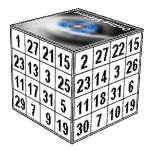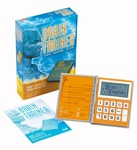Published on Tuesday, April 17, 2007 in
fun,
software,
TV,
videos
 My last post of 2006 concerned the TV show Connections being uploaded to YouTube. Perhaps not surprisingly, YouTube has since removed this series.
My last post of 2006 concerned the TV show Connections being uploaded to YouTube. Perhaps not surprisingly, YouTube has since removed this series.
Thanks to Clickcaster's Connections video podcast, you now have a second chance to see the complete series! Since this is a podcast, you can subscribe to it and store it on your computer or portable MP4 player to watch at your convenience. Also, each episode is a single file, instead of the chopped-up episodes posted on YouTube.
As an added bonus, Clickcaster also has every episode of The Day The Universe Changed, too! This was James Burke's second documentary series, released in 1985. While Connections focused on several central inventions, such as the atomic bomb, the telephone, the computer and so on, The Day The Universe Changed focused on the historical moments that whole concepts changed, such as medicine, physics, and finance.
Instead of the traditional linear manner of teaching history, where it's taught that first came the telegraph, then the telephone, then the TV, both of these series teach history in a ping-pong manner. Did you know that, when the Normans first used the stirrup in the Battle of Hastings, it started a chain reaction that lead to modern telecommunications? Does it even seem possible that El Cid and his band made an accidental discovery that led directly to the invention of the modern university degree? Just like today doesn't happen in straight lines, neither did the past. James Burke's unique manner of teaching history helps give it a more real-world feel, and makes it easier to grasp.
If you're not familiar with either of these series, I ask that you at least consider taking a look at the first episode of both. The podcasts are free, and the time invested in learning about history in such a highly involving manner will be time well spent!

 Here's a quick trip around the internet for a great collection of various mental challenges:
Here's a quick trip around the internet for a great collection of various mental challenges:

 Living in Las Vegas, it's not uncommon for me to run across people from all around the world. As this has been happening to me more and more, my thoughts are beginning to turn to learning a new language. In my case, learning a second language is becoming more and more economically important, which is just one of the reasons discussed in the article
Living in Las Vegas, it's not uncommon for me to run across people from all around the world. As this has been happening to me more and more, my thoughts are beginning to turn to learning a new language. In my case, learning a second language is becoming more and more economically important, which is just one of the reasons discussed in the article  Last night,
Last night,  The
The 
 My last post of 2006 concerned the TV show
My last post of 2006 concerned the TV show 

 Check out the
Check out the 

